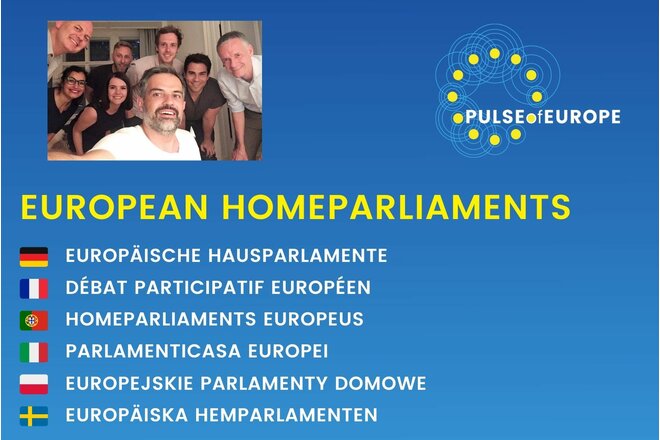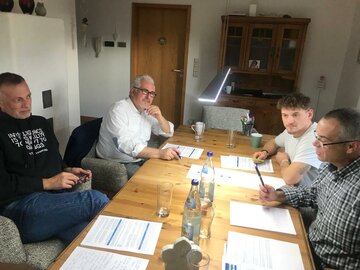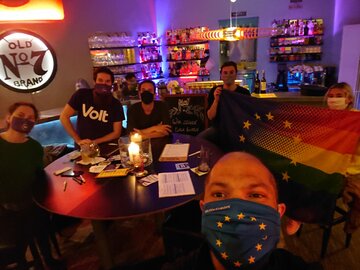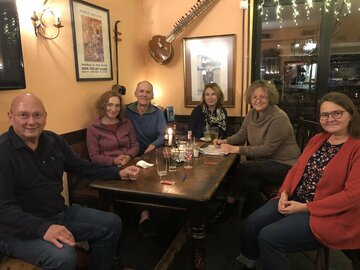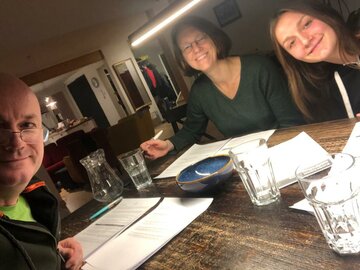achtergrond
The effects of the corona crisis on health and the economy are unprecedented. In the course of its development, the different perceptions and needs of the EU countries have become clear and painful memories of the financial crisis have been reawak-ened. At the same time, political decisions of hitherto unknown magnitude have been taken, illustrating the extent of the political room for manoeuvre. It raises the question what significance solidarity should have in the EU?
Subvragen
1. Should wealthy EU Member States provide more economic support to Member States that are particularly hard hit by crises?
Achtergrond: Both the financial crisis from 2007 onwards and the corona pandemic have hit and continue to hit some EU countries particularly hard and these countries have less means of getting their economies back on track through financial stimuli. In the event of a crisis, the EU could support these countries in finding a way out of the crisis.
Pro
The single market and the common currency means that creditor/donor countries, especially the strongest exporting countries, also benefit from the provision of support to se-verely affected economies since this stimulates demand.
Financial support is a signal of solidarity and mutual trust. Both are important prerequisites for effective cooperation between the EU community of states, for example, when dealing with global players such as China or the USA.
Financial solidarity strengthens the belief in the EU in affect-ed populations. In this way, efforts to leave the EU are avoided.
Contra
The economic weakness of some EU countries is primarily a result of their own financial and fiscal policies. Financial support from other countries undermines necessary structural reforms.
The support of economies of other countries cannot be ex-plained to one’s own population. This strengthens Eurosceptic initiatives.
It is impossible for governments and experts to distribute funds as efficiently as the free market does. EU financial in-terventions in national economies therefore restrict growth.
Aanvullingen uit de vergaderingen
Ensure inclusiveness - every village in the EU (not only big cities) should see benefits of the EU and its actions. We need to make the EU more local (i.e. ppl who do not travel do not find EU passports or roaming appealing enough), extend exchanges to 'every EU citizen one week EU trip' to explore neighbour country and face diversity or cultural fears, Make EU Single Market great again. In summary more sophisticated and targeted EU awareness campaign - also linking money with values so that EU does not equals money only to citizens.
Mutual solidarity is not possible if democratic practices in some member states is called into question, for example in Poland and Hungary.
2. Should the EU invest more in social policy measures to tackle social inequality between the Member States?
Achtergrond: While in the past the differing standards of living in the countries of the EU were moving closer together, this trend has reversed since the financial crisis of 2007. Even when taking differences in the cost of living into account, large sections of the population in various EU countries are still in a very weak social position. As a result, there is a growing gap between the north and south of the EU as well as between the west and east with regard to social security. Examples of social policy measures include protection against unemployment, loss of housing, poverty in old age and health.
Pro
If all EU citizens have similar social security coverage, the sense of community and a European identity will be strengthened. This creates support for future shared pro-jects.
Social and societal progress are fundamental values of our European society and democracy ("EU’s promise of pros-perity").
High standards of living and socially desirable prospects in each Member State reduce poverty-related migration within the EU.
Contra
Given the different social security systems and cultural back-grounds among the EU Member States, a centrally controlled social policy can only fail.
The same social security for all EU citizens would consume large sums of money which would then no longer be available for other investments for the future such as environmental protection, digitization or education.
Even within individual EU countries, an ever widening prosperi-ty gap has emerged in recent decades. It must therefore be the task of the States to protect their own populations against the risk of poverty.
Aanvullingen uit de vergaderingen
EU should eventually become one, convergent social single market but it requires wider reform including pan-European taxes. No taxation without representation.
Investing and intervening too much in social policy measures diverts responsibility from individual country heads, towards the overarching EU. Each country needs to make their own decisions based on their local needs and values.
3. Should the EU, in the interest of future generations, primarily focus on environmentally friend-ly innovation and jobs?
Achtergrond: We are heading for severe global warming well above the targets of the Paris Climate Agreement. Uncontrolled climate change would lead, among other things, to extreme weather conditions and thus to deaths and further migration movements. The less developed countries and future generations would suffer as a result. To combat the corona crisis, the EU is investing an unprece-dented amount of money and could thus give the "Green Deal" a significant boost.
Pro
It is better to change course today than tomorrow. If we con-tinue to delay fundamental reforms to avert the climate crisis, negative consequences for the Earth, societies and democ-racy will become ever greater- as will the costs of transfor-mation.
To overcome the economic corona crisis, the EU is taking on large debts that will have to be repaid over decades. There-fore, all EU investments should be sustainable, both eco-nomically and ecologically.
The Corona crisis shows that change becomes possible when it is necessary. Europe is currently experiencing a turnaround. This historic opportunity for modernisation must not be wasted.
Contra
If subsidies are withdrawn from CO2-intensive industries, many jobs and prosperity are under threat, especially during and after the current crisis.
Many wealthy countries have increased their prosperity with the help of fossil energy sources. Countries whose economies have a lot of catching up to do cannot be expected to abandon this in favour of a costly reconstruction of their systems.
The energy turnaround is a lengthy process. In order for it to be successful, we must remain competitive. Therefore, the transition must be made gradually.
Aanvullingen uit de vergaderingen
The EU has a unique chance to regain its global leadership with its Green agenda (other countries start following us so let's keep the momentum). Fit for purpose regulation and financing should follow.
Changing course has to be addressed world wide and not only in the EU, to really make a difference. Investing too much time and money could be futile in the big picture / not make enough difference to matter.
Bronnen
- www.europarl.europa.eu/news/en/press-room/20200115IPR70326/q-a-on-the-eu-s-long-term-budget-multiannual-financial-framework-mff
- www.socialeurope.eu/seven-surprising-facts-about-the-italian-economy
- www.bertelsmann-stiftung.de/fileadmin/files/BSt/Publikationen/GrauePublikationen/SJI_2019.pdf
- www.europarl.europa.eu/at-your-service/en/be-heard/eurobarometer/public-opinion-in-the-eu-in-time-of-coronavirus-crisis-2
- www.europarl.europa.eu/at-your-service/files/be-heard/eurobarometer/2020/public_opinion_in_the_eu_in_time_of_coronavirus_crisis_2/en-covid19-survey2-key-findings.pdf
- www.europarl.europa.eu/news/en/press-room/20200712IPR83213/citizens-call-for-a-bigger-eu-budget-to-tackle-crisis-new-survey-shows
- eupinions.eu/de/text/in-crisis-europeans-support-radical-positions
- www.europarl.europa.eu/pdf/eurobarometre/2019/parlemeter-2019-heeding-the-call-beyond-the-vote/report/en-report.pdf
- ec.europa.eu/commission/presscorner/detail/en/ip_20_17
Analyse
Should the EU move towards more mutual solidarity?
toestemmingen 166
Afwijzingen 4
onthoudingen 1
Dit is wat de geadresseerden zeggen
Kommissionspräsidentin Ursula von der Leyen hat auf die Ergebnisse der Europäischen HausParlamente in einem Video-Statement geantwortet. Du kannst es hier anschauen: https://www.youtube.com/watch?v=REitgqCmFf0
voor evaluatie
Manfred Weber hat auf die Diskussionen bei den Europäischen HausParlamenten in einem live-Webinar geantwortet. Du kannst es hier anschauen: https://www.youtube.com/watch?v=AAk_7letUUE
Alle Ergebnisse dieser Runde der Europäischen HausParlamente findest du darüber hinaus hier: https://homeparliaments.eu/ergebnisse-runde-3/
Manfred Weber hat auf die Diskussionen bei den Europäischen HausParlamenten in einem live-Webinar geantwortet. Du kannst es hier anschauen: https://www.youtube.com/watch?v=AAk_7letUUE
voor evaluatieHildegard Bentele hat auf die Ergebnisse der Europäischen HausParlamenten in einem Video-Statement geantwortet. Du kannst es hier anschauen: https://fb.watch/9qlywj9rU7/
voor evaluatieGaby Bischoff hat auf die Ergebnisse der Europäischen HausParlamenten in einem Video-Statement geantwortet. Du kannst es hier anschauen: https://fb.watch/9qmuYjR_ha/
voor evaluatiePedro Marques hat auf die Ergebnisse der Europäischen HausParlamente in einem Video-Statement geantwortet. Du kannst es hier anschauen: https://fb.watch/9ZPvpSIWS_/
voor evaluatieFabienne Keller hat auf die Diskussionen bei den Europäischen HausParlamenten in einem live-Webinar geantwortet. Du kannst es hier anschauen: https://www.youtube.com/watch?v=lAy6s6k2mLQ
voor evaluatieGwendoline Delbos-Corfield hat auf die Diskussionen bei den Europäischen HausParlamenten in einem live-Webinar geantwortet. Du kannst es hier anschauen: https://www.youtube.com/watch?v=9p1hvoC1GdA
voor evaluatieSka Keller hat auf die Ergebnisse der Europäischen HausParlamente in einem Video-Statement geantwortet. Du kannst es hier anschauen: https://fb.watch/9ZPMaKczXt/
voor evaluatieFranziska Brantner hat auf die Diskussionen bei den Europäischen HausParlamenten in einem live-Webinar geantwortet. Du kannst es hier anschauen: https://www.youtube.com/watch?v=9p1hvoC1GdA
voor evaluatieMartin Schirdewan hat auf die Diskussionen bei den Europäischen HausParlamenten in einem live-Webinar geantwortet. Du kannst es hier anschauen: https://www.youtube.com/watch?v=hB97Xcnknlw
voor evaluatieHelmut Scholz hat auf die Diskussionen bei den Europäischen HausParlamenten in einem live-Webinar geantwortet. Du kannst es hier anschauen: https://www.youtube.com/watch?v=hB97Xcnknlw
voor evaluatieNicola Beer hat auf die Diskussionen bei den Europäischen HausParlamenten in einem live-Webinar geantwortet. Du kannst es hier anschauen: https://www.youtube.com/watch?v=lAy6s6k2mLQ
voor evaluatieŁukasz Kohut hat auf die Diskussionen in den Europäischen HausParlamenten in einem live Ergebnis-Webinar geantwortet. Du kannst es hier anschauen: https://youtu.be/7-_4fhsT9hE
voor evaluatieMoritz Körner hat auf die Ergebnisse der Europäischen HausParlamenten in einem Video-Statement geantwortet. Du kannst es hier anschauen: https://fb.watch/9qpUP88Ioc/
voor evaluatieMichael Bloss hat auf die Ergebnisse der Europäischen HausParlamente in einem Video-Statement geantwortet. Du kannst es hier anschauen: https://fb.watch/9ZRs-KtWJZ/
voor evaluatieHannah Neumann hat auf die Ergebnisse der Europäischen HausParlamenten in einem Video-Statement geantwortet. Du kannst es hier anschauen: https://fb.watch/9qpvGwBZGW/
voor evaluatieSergey Lagodinsky hat auf die Ergebnisse der Europäischen HausParlamenten in einem Video-Statement geantwortet. Du kannst es hier anschauen: https://fb.watch/9qq2_VU6aU/
voor evaluatieJan-Christoph Oetjen hat auf die Ergebnisse der Europäischen HausParlamenten in einem Video-Statement geantwortet. Du kannst es hier anschauen: https://fb.watch/9qoGHbUNH2/
voor evaluatie
Jutta Paulus hat auf die Ergebnisse der Europäischen HausParlamenten in einem Video-Statement geantwortet. Du kannst es hier anschauen: https://fb.watch/9qp0zRrNKB/
Außerdem hat sie ein schriftliches Statement eingereicht, das du hier lesen kannst: https://drive.google.com/file/d/1VkDcpUgfwUFB9uYfEtCRmCyPFNXCnjLQ/view?usp=sharing
Katarina Barley hat auf die Ergebnisse der Europäischen HausParlamente in einem live Ergebnis-Webinar geantwortet. Du kannst es hier anschauen: https://youtu.be/7-_4fhsT9hE
voor evaluatieMichael Theurer hat auf die Ergebnisse der Europäischen HausParlamente in einem Video-Statement geantwortet. Du kannst es hier anschauen: https://fb.watch/aclhtNIp3D/
voor evaluatie1. Should wealthy EU Member States provide more economic support to Member States that are particularly hard hit by crises?
De stemresultaten zijn samengesteld uit 945 ingevoerde resultaten.
Trend (mediaan)
gemeen
2. Should the EU invest more in social policy measures to tackle social inequality between the Member States?
De stemresultaten zijn samengesteld uit 933 ingevoerde resultaten.
Trend (mediaan)
gemeen
3. Should the EU, in the interest of future generations, primarily focus on environmentally friend-ly innovation and jobs?
De stemresultaten zijn samengesteld uit 932 ingevoerde resultaten.
Trend (mediaan)
gemeen
